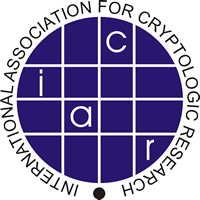
eprint.iacr.org/2023/1071
Preview meta tags from the eprint.iacr.org website.
Linked Hostnames
5- 24 links toeprint.iacr.org
- 1 link tocreativecommons.org
- 1 link toia.cr
- 1 link toiacr.org
- 1 link toorcid.org
Thumbnail

Search Engine Appearance
Fiat-Shamir Security of FRI and Related SNARKs
We establish new results on the Fiat-Shamir (FS) security of several protocols that are widely used in practice, and we provide general tools for establishing similar results for others. More precisely, we: (1) prove the FS security of the FRI and batched FRI protocols; (2) analyze a general class of protocols, which we call $\delta$-correlated, that use low-degree proximity testing as a subroutine (this includes many "Plonk-like" protocols (e.g., Plonky2 and Redshift), ethSTARK, RISC Zero, etc.); and (3) prove FS security of the aforementioned "Plonk-like" protocols, and sketch how to prove the same for the others. We obtain our first result by analyzing the round-by-round (RBR) soundness and RBR knowledge soundness of FRI. For the second result, we prove that if a $\delta$-correlated protocol is RBR (knowledge) sound under the assumption that adversaries always send low-degree polynomials, then it is RBR (knowledge) sound in general. Equipped with this tool, we prove our third result by formally showing that "Plonk-like" protocols are RBR (knowledge) sound under the assumption that adversaries always send low-degree polynomials. We then outline analogous arguments for the remainder of the aforementioned protocols. To the best of our knowledge, ours is the first formal analysis of the Fiat-Shamir security of FRI and widely deployed protocols that invoke it.
Bing
Fiat-Shamir Security of FRI and Related SNARKs
We establish new results on the Fiat-Shamir (FS) security of several protocols that are widely used in practice, and we provide general tools for establishing similar results for others. More precisely, we: (1) prove the FS security of the FRI and batched FRI protocols; (2) analyze a general class of protocols, which we call $\delta$-correlated, that use low-degree proximity testing as a subroutine (this includes many "Plonk-like" protocols (e.g., Plonky2 and Redshift), ethSTARK, RISC Zero, etc.); and (3) prove FS security of the aforementioned "Plonk-like" protocols, and sketch how to prove the same for the others. We obtain our first result by analyzing the round-by-round (RBR) soundness and RBR knowledge soundness of FRI. For the second result, we prove that if a $\delta$-correlated protocol is RBR (knowledge) sound under the assumption that adversaries always send low-degree polynomials, then it is RBR (knowledge) sound in general. Equipped with this tool, we prove our third result by formally showing that "Plonk-like" protocols are RBR (knowledge) sound under the assumption that adversaries always send low-degree polynomials. We then outline analogous arguments for the remainder of the aforementioned protocols. To the best of our knowledge, ours is the first formal analysis of the Fiat-Shamir security of FRI and widely deployed protocols that invoke it.
DuckDuckGo
Fiat-Shamir Security of FRI and Related SNARKs
We establish new results on the Fiat-Shamir (FS) security of several protocols that are widely used in practice, and we provide general tools for establishing similar results for others. More precisely, we: (1) prove the FS security of the FRI and batched FRI protocols; (2) analyze a general class of protocols, which we call $\delta$-correlated, that use low-degree proximity testing as a subroutine (this includes many "Plonk-like" protocols (e.g., Plonky2 and Redshift), ethSTARK, RISC Zero, etc.); and (3) prove FS security of the aforementioned "Plonk-like" protocols, and sketch how to prove the same for the others. We obtain our first result by analyzing the round-by-round (RBR) soundness and RBR knowledge soundness of FRI. For the second result, we prove that if a $\delta$-correlated protocol is RBR (knowledge) sound under the assumption that adversaries always send low-degree polynomials, then it is RBR (knowledge) sound in general. Equipped with this tool, we prove our third result by formally showing that "Plonk-like" protocols are RBR (knowledge) sound under the assumption that adversaries always send low-degree polynomials. We then outline analogous arguments for the remainder of the aforementioned protocols. To the best of our knowledge, ours is the first formal analysis of the Fiat-Shamir security of FRI and widely deployed protocols that invoke it.
General Meta Tags
19- titleFiat-Shamir Security of FRI and Related SNARKs
- charsetutf-8
- viewportwidth=device-width, initial-scale=1, shrink-to-fit=no
- citation_titleFiat-Shamir Security of FRI and Related SNARKs
- citation_authorAlexander R. Block
Open Graph Meta Tags
7- og:imagehttps://eprint.iacr.org/img/iacrlogo.png
- og:image:altIACR logo
- og:urlhttps://eprint.iacr.org/2023/1071
- og:site_nameIACR Cryptology ePrint Archive
- og:typearticle
Link Tags
2- stylesheet/css/dist/css/bootstrap.min.css
- stylesheet/css/eprint.css?v=10
Links
28- https://creativecommons.org/licenses/by/4.0
- https://eprint.iacr.org
- https://eprint.iacr.org/2023/1071.pdf
- https://eprint.iacr.org/about.html
- https://eprint.iacr.org/archive/versions/2023/1071